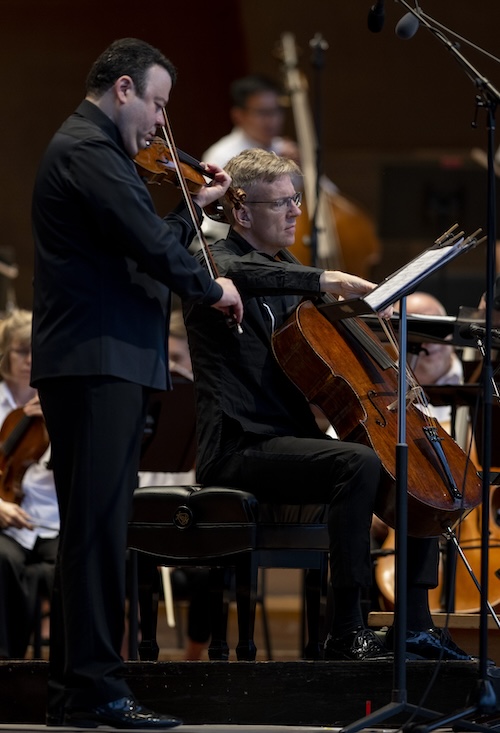Gluzman, Moser a simpatico Brahms duo on a noisy night at Grant Park

On Friday’s overcast evening, Carlos Kalmar led the penultimate program of his 25-year tenure as artistic director and principal conductor of the Grant Park Orchestra.
For those who have spent many such nights with Kalmar and his Grant Park colleagues at Millennium Park’s Pritzker Pavilion, there was a palpable if implicit air of wrapping things up, while Kalmar led a varied, colorful program with the engaging expertise one has come to expect over his many years of leadership.
The program opened with Kalmar offering his last festival premiere in Elena Kats-Chermin’s Mythic, a 2004 work loosely inspired by the Australian composer’s experience peering into a deep cave. Her score begins with a murky cello line of ambiguous harmony, gradually joined by the upper strings. Mythic builds energy around an obsessive descending three-note motive over a passacaglia-like ground bass.
Moments of dark cinematic drama emerge from these simple elements amidst a general feel of gravitas. Kalmar organically paced the work’s inexorable development, expertly balancing its dense textures before guiding the music’s retreat to a softly shimmering close.
Brahms’ Concerto in A Minor for Violin, Cello, and Orchestra, Op. 102, followed, with standout soloists Vadim Gluzman and Johannes Moser. Kalmar has long excelled in the Austro-German repertoire and it felt fitting that Brahms’ last orchestral work was also the final concertante score Kalmar would lead as director of the summer series.
The score begins with a curious introductory paragraph, and cellist Moser was searing in opening recitative, matched in force by Gluzman’s swirling figuration before the first proper tutti took flight under Kalmar. The two soloists were a fiery simpatico pair, fluently negotiating the complex interplay of their lines throughout the Allegro’s impassioned episodes.
The Andante is a study in contrast and found Gluzman and Moser eloquently singing their searching octave lines as Kalmar provided warm, responsive orchestral support. Brahms wrote the Double Concerto as a peace offering following his estrangement from the renowned violinist Joseph Joachim, and collectively Gluzman, Moser, and Kalmar perfectly captured this conciliatory feel.
The Vivace non troppo found Gluzman and Moser trading their bounding phrases in Brahms’ Hungarian style, in tune with the movement’s subtle playfulness, while Kalmar knitted orchestra and soloists into a cohesive whole.
As a joint encore, Gluzman and Moser offered three brief movements from the Norwegian composer Henning Kraggerud’s Variations Suite. These playful miniatures, including a darkly hued pizzicato jig, felt like a welcome palate cleanser after the heft of the Brahms.
The second half was devoted to French evocations of Spain in the form of Debussy’s Ibéria from Images and Ravel’s Rapsodie espagnole. These two works share an obvious affinity, written within a decade of each other by the two giants of French impressionist music. Setting them side-by-side is a little too much of a good thing, though Kalmar made the best case for such an extended immersion.
In Debussy, “In the Streets and Byways” saw sultry wind solos and clacking castanets evoke the motion and variety of an urban scene, and Kalmar drew out the nocturnal reveries of “The Fragrances of Night,” elevated by Mitchell’s Kuhn’s plangent oboe solos. “The Morning of the Festival Day” had the feel of awakening and anticipation, though its disjunct writing never really arrives at a gratifying climax, as Kalmar alluded to in his introductory remarks.
As downtown Chicago’s evening turned into night the sirens became almost constant throughout Rapsodie espagnole. Kalmar would wait patiently between movements, only for a fresh blaring to start the moment he had given a downbeat, leading to sympathetic laughter from the audience.
Still, Kalmar and the orchestra made the best of a bad situation. If much of the work’s texture and transparency were obliterated, one could discern the haunting elements of “Prélude à la nuit,” plus languid English horn solos from Anne Bach. Kalmar whipped up a storm in the closing “Feria” to compete with the street din and end the night with a festive bang.
The program will be repeated 7:30 p.m. Saturday. grantparkmusicfestival.com
Posted in Performances

